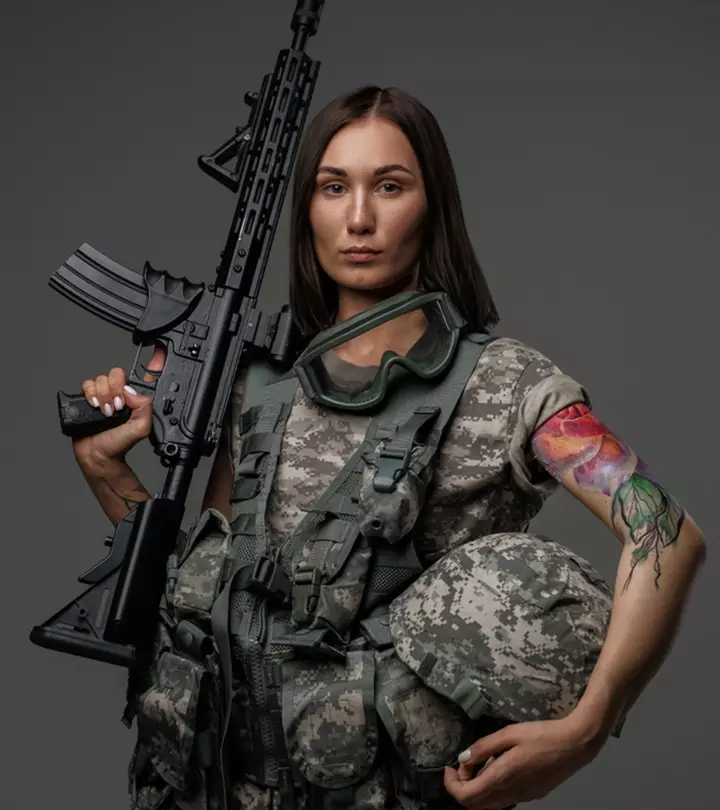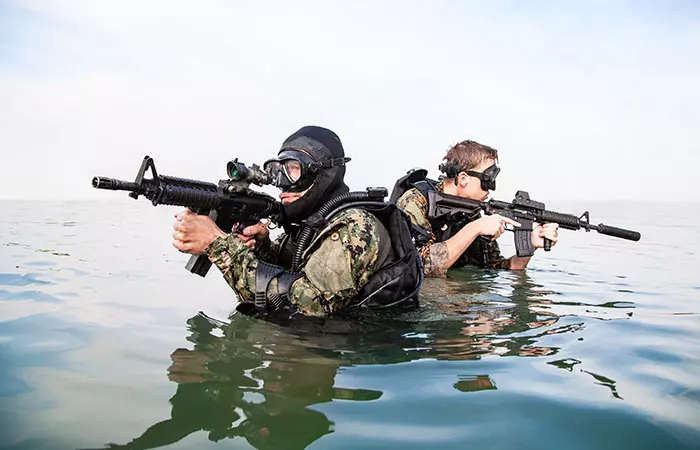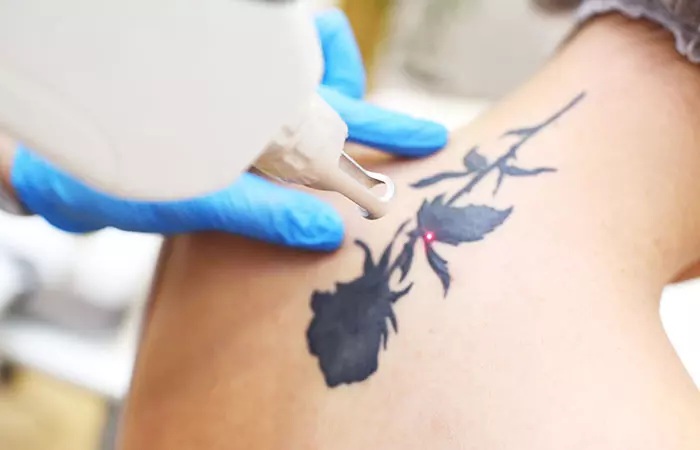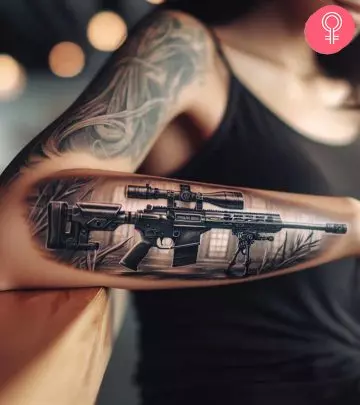Can You Have Tattoos In The Military? A Complete Guide
Discover if your ink can dash your dreams of serving in the military.

Image: Shutterstock
Tattoos are a means of self-expression and freedom and sometimes a remnant of a blasting bender. However, for individuals aspiring to join the military services or those already in the armed services, it is one of the most pressing concerns. Can you have tattoos in the military? Given the increasing popularity of different tattoo ideas, particularly among the younger generation, this concern is genuine. Restrictive tattoo policies have not only stopped many aspiring soldiers from joining the military but have also created challenges in the recruiting process and led to the loss of excellent army recruits.
However, there have been changes in the policies for tattoo permissions to accommodate soldiers on active duty and maintain a disciplined military appearance. If you want to learn more about tattoos and armed forces recruitments, scroll down to find out.
In This Article
Can You Have Tattoos In The Military?

It is a misconception that tattoos are not allowed in the military. That being said, there is no “yes/no” answer to the question “can you have tattoos in the military?”
The U.S. Government Accountability Office (U.S. GAO) allows soldiers in almost all branches of the military to have inked designs. However, there are rules regarding the size, placement, and content of tattoos.
All the military branches, be it the U.S. Army, Navy, Air Force, Coast Guard, Space Force, or Marine Corps, have a strict policy against tattoos related to drugs, sex, violence, or gang affiliation in any way. Additionally, your body art cannot promote sexual, religious, or racial discrimination.
It is important to understand the regulations and policies regarding tattoos before joining the military. Check out the next section to find out.
Key Takeaways
- Tattoos are allowed in the military but with limitations in terms of number, size, and placement.
- Most branches of the military allow tattoos on the arms, legs, back, and chest. However, it is better to check the regulations of the concerned military branch before applying for service.
- A military tattoo waiver is an exception that can be granted to those with an unauthorized tattoo that violates the regulations.
Tattoo Regulations And Policies
Every branch of the military has its own set of tattoo regulations and policies according to which they scrutinize the recruits. Given below are the tattoo policies followed in the army, navy, and air force.
Army Tattoo Regulations And Policies
If you aspire to join the army, tattoos on your wrist, face, head, ears, or neck are not your best friends. So, where can you have tattoos in the army? According to the updated army tattoo rules, one can get tattoos on the arms and legs as long as they do not become visible above the collar. Plus, back and chest tattoos are allowed as well.
The U.S. Army recently updated its policies on recruitment and tattoos on hand and neck tattoos. Soldiers in the U.S. Army can have one tattoo on each hand that is up to 1 inch in length. Tattoos on the back of the neck can be up to 2 inches long. One can have a 1-inch behind the ear tattoo as well. Additionally, a finger ring tattoo or finger tattoo is permissible as long as it is not visible when the hands are closed.
 Trivia
TriviaThe tattoo regulations differ in the navy. So, it happens to be your dream service branch, learn about the U.S. Navy tattoo regulations below.
Navy Tattoo Regulations And Policies

The U.S. Navy has also updated its tattoo regulations and policies to attract potential recruits and retain talented individuals. There are lenient tattoo policies in the Naval Services that may help recruit those who are willing to serve.
Multiple tattoos or body markings of any length are allowed on arms and legs. Plus, a single neck tattoo no bigger than 1 square inch and a single ring tattoo on the finger are permitted.
The U.S. Air Force is another lucrative branch that many aspire to join. Learn about their tattoo policies in the section below.
Air Force Tattoo Regulations And Policies
The Air Force updated its tattoo regulations and policies in March 2016. It said that one can tattoo no more than 25% of the skin that is visible in any uniform. Tattoos on the chest, back, arms, and legs that remain below the open-collar uniform are considered authorized body art. A single band tattoo no wider than ⅜ of an inch and placed above the finger joint and below the knuckle is allowed. Moreover, there are no tattoo size or placement restrictions on other tattoos that are in alignment with the official rules.
These tattoo policies and military regulations can help you decide the ideal places for getting inked before joining your dream military branch. But what if you already have one? Find out below.
Military Tattoo Waiver

A military tattoo waiver allows a person with an unauthorized tattoo that does not meet the military tattoo policies to join their military branch of choice. One may apply for this process but waiver exceptions are not guaranteed. Each military branch has its own tattoo regulations and policies as well as the conditions for approval and assessment of tattoos. The applicants for service will have to convince the senior leaders or officials and provide relevant information for the waiver process. They have to consult a recruiter about the current policies of the specific branch, submit all the requirements for waiver requests, and wait for a decision after completing the waiver processes.
It is an option that you can try if you want to keep your tattoo as well as your dream career. If you are able to convince the branch officials, you may be able to join the force without getting rid of your tattoo. Although the decision is dependent on the assessment process and the officials, the following factors may work in the candidate’s favor:
1. Size
Less visible, light tattoos and simple tattoo designs are more likely to be allowed than the larger or facial tattoos.
2. Content
Tattoos with personal content or cultural tattoos are allowable tattoos. However, ones with controversial content may not be considered.
3. Documents
It may increase your chances of getting the waiver if you can produce the documents that prove your tattoo’s special meaning.
4. Record
A clean record with no questionable past events may also work in the candidate’s favor.
 Trivia
TriviaMilitary tattoo waiver is one option. But what else can you do if your tattoo does not meet military standards? Find out in the next section.
What Can You Do If Your Tattoo Does Not Meet Military Standards?

If you are determined to pursue a military career and you already have a tattoo that does not align with the military tattoo regulations or the policies of the particular branch that you are applying to, this is the second option you can opt for:
Tattoo Removal

This is a permanent option that gets rid of your tattoo altogether. Most people opt for laser tattoo removal that involves removing the tattoo completely via several sessions. However, it is a costly and time-consuming option and may not be suitable for those attached to their tattoos.
Tattoos are a means of personal expression. However, they are a matter of concern for the aspirant wishing to join the military forces. Although tattoos are not strictly prohibited in all military branches, there are several rules around the subject of body markings in the U.S. Army, Navy, Marine Corps, Air Force, or Coast Guard. All branches have their own rules that govern the placement and content of tattoos. Tattoos on the face, head, ears, and visible parts of the body are strictly prohibited in almost all branches, while eligible tattoos on legs and arms that remain under the uniform are permissible. However, if you got a tattoo before joining the force, you may request for a military tattoo waiver or get it removed. It is a good idea to speak with a military recruiter who can provide the most reliable and updated guidance to fully help you understand current regulations and how they might apply to you.
Frequently Asked Questions
Will the military pay for tattoo removal?
No, there is no provision that requires the military to pay for a tattoo removal service unless it is a medical case.
Can Army Special Forces have tattoos?
Yes, soldiers in the Army special forces may have tattoos. However, they cannot get them on the face, neck, or hands. They are not allowed to get band ring tattoos on fingers or on body parts visible after wearing the uniform.
What happens if you get an unauthorized tattoo in the military?
The consequences of getting an unauthorized tattoo in the military may include counseling and reprimand, restricted duties or loss of privileges, administrative separation, article 15 punishment that include fines, extra duty, or reduction in rank, or even court-martial in rare cases.
Illustration: Can You Have Tattoos In The Military? A Complete Guide

Image: Stable Diffusion/StyleCraze Design Team
The US Army recently relaxed its tattoo policies and restrictions on tattoos for recruits and aspiring candidates. Check out this interesting and informative video to learn more about the current tattoo policy updates in the military.
Read full bio of Brik Rangel
Read full bio of Gazala Firdos Ansari
Read full bio of Eshna Das
Read full bio of Shreya Mukherjee

























Community Experiences
Join the conversation and become a part of our empowering community! Share your stories, experiences, and insights to connect with other beauty, lifestyle, and health enthusiasts.